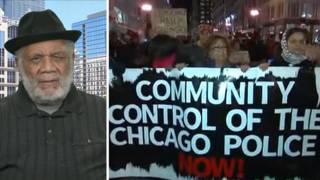
We get an update on a major victory for progressives in Chicago’s mayoral race, where union organizer and former teacher Brandon Johnson narrowly defeated Paul Vallas in a runoff election Tuesday. Johnson called for community investment, while Vallas, who was backed by the police union, focused his campaign on crime. “Now comes the difficult part of governance,” says Democracy Now! co-host Juan González, who is in Chicago and notes Johnson faces a hostile police force and skepticism from the city’s business community.
Transcript
AMY GOODMAN: This is Democracy Now!, democracynow.org, as we go from Wisconsin to Chicago, another closely watched race. Brandon Johnson was elected mayor of Chicago in a major victory for progressives. Johnson, a Black teachers’ union organizer, defeated conservative Democrat Paul Vallas, a champion of charter schools who ran on a law-and-order platform. Johnson won even though Vallas had outspent him two to one. Brandon Johnson spoke last night to supporters.
MAYOR-ELECT BRANDON JOHNSON: So, Chicago, I’ll say it this day. Today, we take big steps towards figuring it out here. So I believe, since we are taking steps to figure it out here, let’s take this bold progressive movement around these United States of America.
AMY GOODMAN: So, Juan, that’s Brandon Johnson. You’re in Chicago. Talk about the significance of this victory.
JUAN GONZÁLEZ: Yes, Amy. All the polls had been predicting a dead heat. It was a close race, the narrowest margin since Harold Washington won election as Chicago mayor back in 1983. But Brandon Johnson did succeed in building — rebuilding a progressive coalition to be able to capture the mayoralty. He won impressive majorities in various groups across the city.
In the African American community, he did far better than the polls were showing. So, basically, the undecided African American voters broke in the last week almost completely for him. He did win a majority of the Latino wards of the city. But at the same time, Paul Vallas did do very well in some other Latino wards in the city. In the areas of Humboldt Park, West Town, Logan Square, Avondale, the historically Puerto Rican neighborhoods of the North Side of Chicago, Brandon Johnson racked up in the almost 70% of the vote. But in some of the more middle-class Latino neighborhoods of the Southwest Chicago, actually Paul Vallas had the majority of the vote. So, Brandon Johnson did win a significant majority among the Latino community, which, of course, has been the fastest growing. But Vallas did have significant support, obviously, in the white community and in some sections of the Latino community, as well.
Now comes the difficult part of governance, because Brandon Johnson is going to be facing a police department, police officers who see him as their worst nightmare. He’s going to be facing a business community that is definitely worried about some of his pronounced policy positions. And, of course, the billionaires who continue to fund the charter school movement are going to be — also going to find a difficult situation with the new mayor.
So we’re going to be — a key aspect of this, of course, was the power in the mobilization and the money of major labor unions, like the Service — SEIU, the Service Employees International Union, the teachers’ union especially, the Chicago Teachers Union. Those were the main bulwarks of the ground organization that Brandon Johnson was able to put together, as well as the financing that he was able to raise.
AMY GOODMAN: Well, of course, we’ll continue to follow what happens in Chicago, with you right there in the middle of everything, Juan.
Next up, we’re going to go to Tennessee, where Republicans are trying to expel three Democratic lawmakers for supporting student-led gun control protests at the state Capitol after last week’s school shooting in Nashville. We’ll speak with one of the legislators they’re trying to expel. Stay with us.












Media Options